Affiliate disclosure: This post may contain affiliate links. Please see our Privacy Policy.
Connecting to the power grid was one of the worst decisions we’ve made on our homestead. This is the story of how we connected to the grid only to voluntarily choose to live with it off, and still operate our homestead independently.
After nearly 5 years living completely off the grid, here’s how we came to find ourselves living off the grid, even with a grid connection.
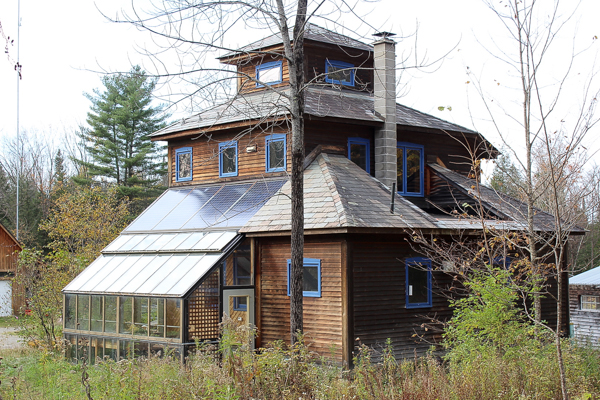
How It All Started
When we moved to our off-grid homestead, the solar system was in place, but the home had been vacant for 2 years. The batteries were dead, and we couldn’t find anyone familiar with that old, obscure type of battery.
We had to guess how much storage we’d need, and we vastly underestimated the battery capacity required to live a self-sufficient lifestyle year-round. Here are our specs for both production and storage if you’re curious.
For 9 months of the year, our panels produce an absurd surplus, and the batteries are full before noon. We’ve invested in a number of “summer appliances” to try to make use of the surplus, and during the summer months, we’re living a life of off-grid luxury.
The remainder of the production goes to waste. Then for the 3 coldest months of winter, we’re short power and need to run the generator 10 to 15 times a month to keep power. Both problems, the summer waste and the winter shortage are due to a lack of battery storage.
The summer waste is unfortunate, especially when averaged over a whole year our panels produce way more electricity than we could possibly use. At the same time, the winter shortage was more of an issue, and running a generator is expensive, noisy and burns a lot of fossil fuel.
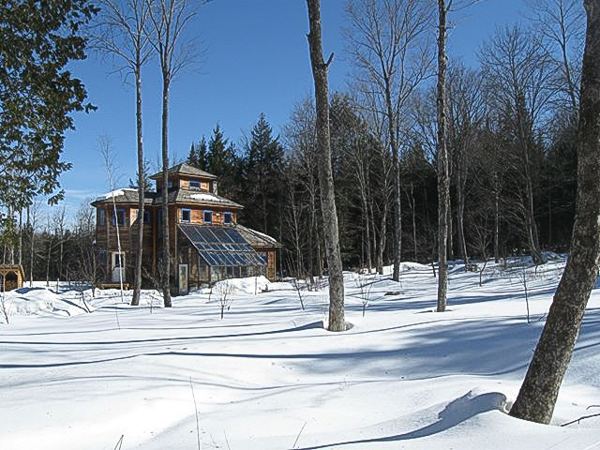
Weighing Our Options
After nearly 5 years off the grid, we were at an impasse. We were tired of living in boom and bust cycles with power, and we needed a solution. We had two options, both of which would cost about the same amount of money:
- Invest in more battery storage, and also add a sun tracking ground-based solar array that could be cleared of snow during the winter months (as opposed to our roof panels that would occasionally get iced in).
- Connect to the grid and use the grid as a giant battery bank. Ideally, net metering our summer surplus and drawing it back during the winter months. Total production exceeds our annual usage, so we’d never have to pay an electric bill.
Why We Connected To The Grid
Call me an idealist, but it just seemed so wasteful to produce so much extra electricity in the summer months and let it all go to waste. Even with more battery storage, there would still be a lot of summer surplus and donating that all back to the grid just seemed like the right thing to do.
We had this vision that we could use net metering and the power grid to bank our summer excess production and use it in the winter months. We’d still have a surplus, as our summer surplus far exceeds our winter needs. It seemed like a win-win, where we’d be donating our surplus to the power company, and they’d be providing in effect a large battery bank for our winter needs.
We could have invested in more batteries and invested more heavily in our own self-sufficiency, and in hindsight that would have been the right decision. If I could do it all again, I would never consider connecting to the grid.
How it All Went Wrong
The initial setup went well. Power lines were put up most of the way up our long driveway, and we dug a trench to bury the final ~200 feet approaching the house for aesthetics.
Everything went seamlessly, and in no time flat we were “on the grid.” We flipped on the switch to test it, and power ran in through the inverter from the grid as if the generator was running. Perfect.
The net metering meter was on back order and wouldn’t arrive for a few weeks, so we’d be feeding power back into the grid without credit for a while, but that was pretty minimal in the grand scheme of things.
When the meter finally arrived, they sent out a tech to install it. That’s when the problem began…
He took one look at the system and had a meltdown. “You have batteries?!?!” he said.
Of course, we have batteries, we were off the grid for nearly 5 years, how do you think this works? He didn’t say another word, other than he couldn’t install the meter and we’d hear from them.
Batteries and the Grid
After a lot of frustrating communication with the upper-level administrators at the power company, it became clear that they just weren’t comfortable with the fact that our house was self-powered. There’s a small possibility that if a power line went down somewhere down the road, that our batteries could back feed into that line while they were trying to work on it.
While that’s obviously a problem, and I don’t want to see any linemen injured, we’re not the only ones with batteries connected to the grid. Our off-grid contractor gave them several examples of solutions used by others working with other power companies, but they weren’t satisfied.
After we’d paid an absurd amount of money to connect to the grid, they demanded that we either get rid of our batteries altogether or spend $20,000 on installing specialized cutoff switches. That included a lockout on our generator, that prevented it from being used when the power was out. Essentially, causing power to be out at our house anytime it goes out for anyone down the road.
Taking out our batteries isn’t an option, because most of our house is wired in direct current to run directly off the batteries. All of our appliances run on battery power, and can’t run without them. The other option, spending $20k to lock out our own house, was completely unacceptable.
Held Hostage By The Electric Company
At this point, we’d already spent thousands of dollars connecting to the grid, and we couldn’t go back and just upgrade our batteries. We didn’t have grid power or more battery capacity, and our bank account was empty.
The power company didn’t really seem to understand why we were upset. It’s just another bump in the road, and an unexpected cost, but an inevitable one.
At one point, a power company administrator said to me, “You obviously intended to connect to the grid when you bought this place…” I cut him off, and said, “Of course not, we never intended to connect to the grid.”
He quite simply couldn’t believe it. Who would voluntarily choose not to be connected to the grid?
It was that same sense of inevitability that governed all our conversations. They assumed we had no choice, and didn’t understand our frustration.
The electric company assumes that they’re the only option and that no one can exist without them. We’d been just fine for 5 years, and we could have chosen to remain off the grid and just upgrade our system.
It was a coin toss, and we made the wrong choice. That’s not the way they see it.
How We Found Another Way
We’d given up. We were ready to tell the power company to stuff it and tear down the poles. We were out a lot of money, but there was no way we were going to pay $20k to lock ourselves out of our own power system.
A resourceful friend came up with another solution. There’s a type of power inverter that is known as a “non-grid interactive” inverter.
It can only send power in one direction, and it has no option for sending power back over the grid lines. We couldn’t net meter, but there also wouldn’t be the potential risk of back feeding over the power lines.
The grid connection would just be hooked into the inverter as a second generator option, and we could turn on the grid to charge the batteries just like turning on a generator.
Living Off-Grid with a Grid Connection
In the end, it all seems like such a waste. Our surplus electricity in the summer months still goes to waste. Not one watt of our solar production can be used by another household, even though we’re tied into the grid.
Instead of investing in technology to make our household greener and more independent at the same time, we wasted time and money on a grid connection that now sits unused for the most part. While it’s true, we didn’t run our generator at all last winter, that’s only a small consolation. The grid kicks on instead of the generator, but that electricity was produced somewhere and it’s not much cleaner than a propane generator.
For most of the year we live off-grid, but thanks to high “line fees” we still have a power bill each month even when we don’t use power. Vermont has some of the highest electricity rates in the country, so running the grid actually costs about as much as propane for our off-grid generator in the winter months.
In the end, we’re no better off than we were before. We’re out the cost of connecting to the grid, and now we spend more each year on electricity than we ever did on our generator.
That’s our story. That’s how we connected to the grid, regret it, and still live off the grid even with a grid connection.
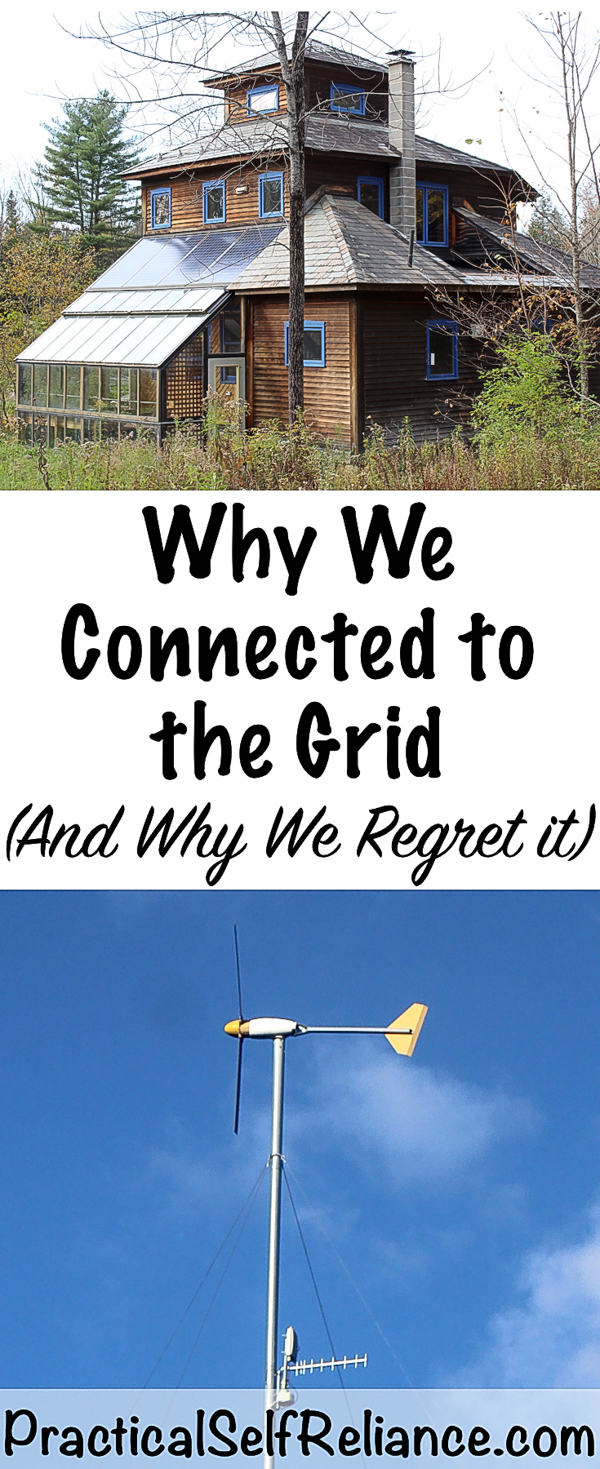
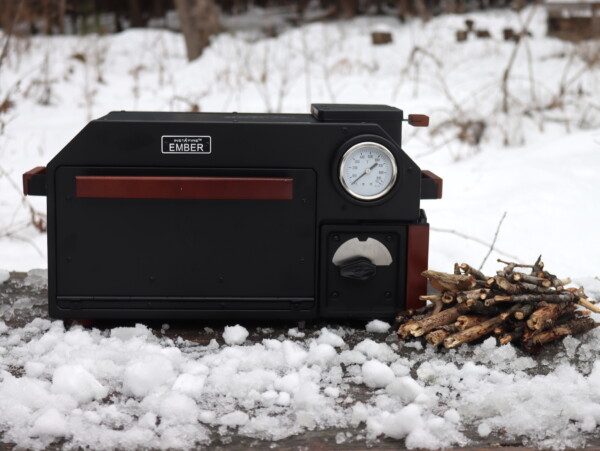
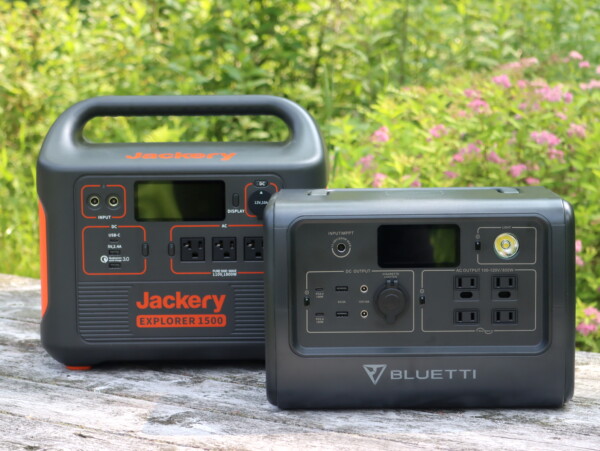
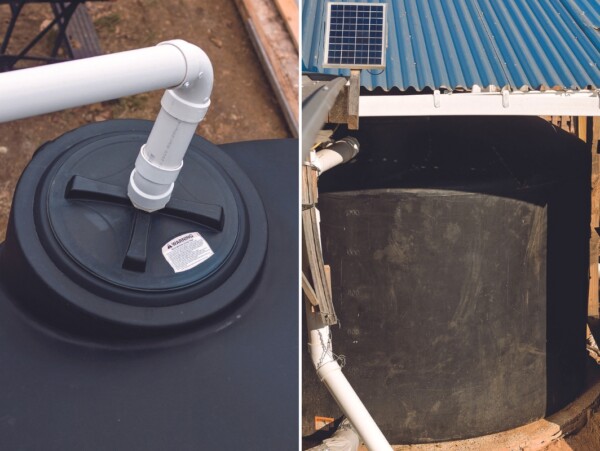
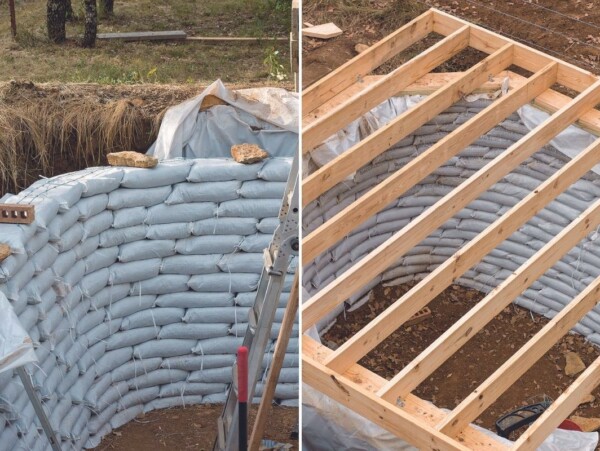
I was thinking about how you could “bank” your excess solar energy for use in winter. I know this will probably sound a little crazy but how about running one or more computers with the excess power and have them mining for crypto currency. Crypto mining seems to have become less popular due to the energy cost of the mining being pretty close to the amount earned. But in your situation where you just want to convert excess solar produced energy to some form of credit that can then be used to pay for energy from the grid in the winter months it may be suitable. Sort of a way to convert excess electricity into cash and then back to electricity when you need it.
The computer or computers you use wouldn’t have to be anything expensive. Yes, more powerful computers can mine faster but they also consume more power and cost more to purchase. Whereas an older computer will produce less but also use less. Just a matter of getting something setup that matches the amount of excess power you generate.
That’s an interesting idea. Thanks for sharing.
This was extremely helpful. We live off grid 20 miles south of you. We have often thought of adding grid tie. An initial assessment to bring power to us is approx 25K. We currently have a sol-ark controller and inverter that I believe would be an easy fix, but after reading about your ordeal I believe we will stay off-grid. What was your total investment to connect to the grid? As you say we produce more power than we need 9 months of the year, but during rainy days and like this oct to jan we used our generator an average of 3 hrs a day. I think your struggle has convinced me to keep our system the way it is. Our system now seems much more efficient. For the first 7 years we accumulated 4K hrs on our generator. With what we now have thinking this will be lowered by one third. We did have everything professionally installed as we had no clue where to begin. We can now do most maintenance on our own.
Thank you again for sharing!
I don’t remember off hand what the total cost of the grid connection was, but there’s been a lot of inflation since then, so the number’s would be totally different now anyway. Your situation sounds very much like ours though!
Hi, what a story, how incredibly frustrating and dispiriting it must have been, born our of a sense of altruism wanting to share your unused summer electricity.Although a small consolation it might be others can benefit from what you learnt.
I have certainly got a lot to learn about solar, we are in Portugal and not to use the power of the sun seems both stupid and a criminal waste, but this is a new area for us and I am aware we could make expensive mistakes.
By the way I love your kvass recipe, I’m going to start it today!
Many thanks
Rachel
You’re very welcome. So glad you enjoyed the post.
Thatis so shameful of the electric company just not to pay all your fees andwork out something where they get electricity from your surplus…nope they are all crooks they want your electric for free and you to pay to give it to them.
We are in the NC mountains and operate off grid with grid as backup but only chose that option because our electric coop does not let you net meter – public utilities in NC are required to let customers net meter so in this case a coop is worse than the big utility. Our house was already on the grid so there was no cost for that. We have enough power from solar for about 9 months but winters are cloudy here. We had previous system with double the batteries but used the same amount of grid KWH because of the long stretches of clouds and the need to keep the batteries healthy by filling every 7ish days. We are happy being off grid but it definitely takes more planning than net metering. Also, wonder if you considered an EV to use your extra power in the summer? A plugin hybrid is my next step.
We have considered it, but we travel so little in the summer…so much to do here in our gardens. I fill up the tank maybe twice during those warm months. In the winter though, we’re out and about a lot more, and they’re not at all practical in vermont winter conditions (no 4 wheel drive). I love the idea, but practically speaking it just wouldn’t work for us.
My friend Teri is just the opposite though, and she does run a plug in from her off grid system not too far down the road from us. She writes about it here: https://homestead-honey.com/living-off-the-grid-with-an-electric-vehicle/
Thanks for replying, I looked at your neighbor Teri’s site and got some good ideas.
I also looked into solar panels. The local big shot power company said they would pay me for any extra power I sent back to them. Turns out it was pennies compaired to dollars they are charging me on grid! They are a giant greedy monopoly and they know it. They have 3 towers on my land and claim a right- of- way over my land. They come here any time they like and spray poisonous herbicides and cut all trees in a constantly changing 50 foot or more swathe to the left & right of each tower. They sprayed near my honey bee hives one year and killed all my bees, They change contractors every year so the men have no idea where to cut or spray. They run everywhere with hoses windward to my home and organic gardens. Not caring about safety or people or pets. I have pictures of the men with no mask, gloves, eyewear or any protection whatsoever. !Its been a nightmare for 30 + years to say the least ! Hate is not the fitting word I have for them. Sory for the rant. It comes every year at the onset of their arrival.
I just found your site researching wild ramps. I like it. I am not off the grid but in general, I think power companies hate off gridders. And why not, since power companies have a monopoly where they operate. They have control and they have dependents who pay every month. All their talk about being green is well and good until in involves someone having the freedom to be net zero or, worse yet, net generator(i.e. competitor) in electricity supply. It’s the money and control they want more than being green. They would prefer you waste your excess power if you won’t submit to them. So much for green. Monopolistic Corporatism in action. Thanks for the information you make available.
We are building our homestead ourselves and its been an adventure..it sounds like it would be advantageous to have them come and disconnect the wire and leave it covered up on top of the pole in case you ever want it instead of paying each month. We had a solar system put in last year…but its attached to the grid metering program. I have asked if we could set up the system to be off grid in case….of whatever. We can get a couple tesla batteries that would power us for less than a week but they need to be hooked to grid. Hypothetically, what if there was no grid…we would have 39 solar panels that are not going to be of any use. I’ve come to conclusion something is very wrong with vt electric. We only put the solar system because our bills were anywhere from 130.00 to 430.00 and I go to bed when it gets dark and always shut things off when not in use…they couldn’t figure out why our bills were mostly outrageous. Good luck!
I am also in Vermont and looking into off-grid/grid-tied options. I would love to know which power company you work with (email is totally fine if you don’t want to call anyone out), so that I can avoid a similar situation!
I know for a fact that this problem has been solved for some time now, because I have just such a system (and I happen to live in Vermont as well).
My solution is by virtue of my Tesla Powerwalls, but the “smart switch” certainly can’t be Tesla-specific and somehow only work with Tesla batteries. The end result is everything you originally wanted: my solar panels generate excess which gets fed back to the grid using it as a virtual “battery” in the form of monetary credits on my electric bill. I can then “draw” from that “battery” during low-sun winter months by dipping into that credit. I have net metering, AND I have batteries AND solar panels, AND it all works even when the power goes out (in fact, I don’t notice when the power goes out since everything switches automatically).
This last part doesn’t apply to you, but I also now get to make use of my solar panels during a power outage. Since I operate normally grid-tied, without the Tesla Powerwalls and the smart switch, my panels auto-disconnected during a grid power outage for the same reason the power company didn’t like your batteries: the risk of energizing lines that the servicepeople need to work on to repair and so need to know with 100% certainty aren’t energized. Because the smart switch makes me “off-grid” during a grid outage, not only do my panels keep operating but I can dump excess into my batteries. With enough sun, I could run indefinitely during an outage.
So clearly the technology exists for such a switch (and I can guarantee that component wasn’t $20K of my system). Hopefully you can revisit this for yourselves.
Thanks for sharing that!
Greetings! Just ran across your blog because we’re having a similar, but opposite, problem with buying a new home that’s off-the-grid. No reason to explain the many reasons we want to go off-the-grid but we found the perfect, most amazing property but…. to our dismay, the VA would not finance it. The only solution they had was getting on-the-grid and the current owners agreed to split the cost (because they couldn’t find a cash buyer) so we paid $12,000 and they paid $12,000 but the lines haven’t been run yet so I’m glad I read your article about the special meter. We’ll be out in the boonies so I guess it’s comforting as backup to the solar and generator but basically defeats the purpose of the whole purchase. The only positive I can give you is that, if you ever decide to sell, now many more people can buy since a traditional mortgage will cover it. Thank you for the read!
That’s awesome, congrats! I’m so glad it worked out for you. Enjoy your new property! 🎉
OH my goodness! I used to live in VT and, when we were looking for a home to buy, I think we considered buying YOUR home (before you owned it, of course). What a small world! I’m glad you are able to use the house and land to the fullest. It was such a beautiful location and home.
Small world indeed! Neat story =)
Hello!
I Just found out about your blog (super interesting by the way!) I just wanted to say that it’s a shame that in 2018-2019, an electricity company gave you so much trouble just for wanting to have the option of being ”off grid”.
Here in Quebec, although HydroQuebec is far from being a great company, they do have a program called ”Net metering” that does exactly what you were hoping to do. (measuring what you inject in the system and giving you credits for it, basically using the grid as a giant battery). Any person who is self producing electricity with renewables is eligible to that program. You have to purchase special equipment that needs to be installed by a skilled electrician and they have to approve of the project, however they don’t seem to be as fussy and it’s very possible to achieve it. It’s possible that integrating the batteries in the system was problematic for some reasons, but there are ways around that. Also don’t know what made them worry about the generator, as here it seems like a lot of people that are on grid still uses them when the power goes out. It’s also a shame since I believe Vermont is actually buying a lot of our electricity that is produced up north. So we are technically on the same grid! (At least it’s hydroelectricity, not the best but not the worst in term of sustainability)
Anyway that were just my thoughts on this situation. I hope people don’t get too discourage from trying it though. They just need to be cautious and to discuss all the fine details with the company they are dealing with. In certain areas it can be great as long as the company is on board with the project. And hopefully with the growing need to switch to renewable energy some companies will try to change their ways of doing things and finally evolve.
I too have a “hybrid system” with 2.8KW of solar, batteries and grid tied. We do not do net metering and we basically did this for the 3-4 dark months when we can’t make enough power via solar. Unfortunately we cannot use wind even though we live in a very windy location in Western Maine. Our unenlightened legislature does not want a home wind turbine within 400 feet of the lake we live beside. I feel your frustration, we live in a society that does not understand self reliance(yet), but the day will come.
Tom Clough
How pathetic of your legislature!
Hopefully you have been able to get this all sorted out as grid-interactive inverters with anti-islanding technology have been common for many years now. At least here in Australia they have. More than one in five houses have a grid-interactive solar setup and the linemen are perfectly safe as the anti-islanding technology prevents any power going to the grid during a blackout. Also the batteries shouldn’t be an issue anymore. Many people are upgrading their solar setup with batteries so they can charge the batteries with solar during off peak and feed that power into the grid during high demand times when the feed in price increases. Hopefully your local power supplier has seen the light and is no longer battery-phobic. 🙂
Not yet, unfortunately…
In Germany they use underground water/ ice silo’s to store energy. The conversion from water to ice gives extra energy storage capacity per cubic metre.
This is SO good to know! We are on grid but have a (commercial/modern) barn that has been disconnected for years. We would need the electric company to come out and inspect before they could put a meter back up to then turn the lines on again. This seals it, were going off grid on the barn and hoping to extend to the house shortly after. Also with the panels on the roof, wanting them on the ground, a GREAT idea, we live in upstate NY and get tons of snow and ice too. Have you ever looked into water turbines? is that an option for you? I see you have a wind turbine, does that supplement for the winter? I love the way you write! quick to read and I feel like were in a conversation. Very fun 🙂
Unfortunately, we don’t have any running water on our land, or I’d love to use a water turbine. Now that think about it though, the rivers freeze over for most of the winter here so it’d only really help in the summer when we have plenty of power. We do have a wind turbine, but we’re in such a sheltered location that it only turns in the worst storms. That does help in winter a bit, but not a lot. Good luck with your barn!
You might not regret being attached to the grid when/If you decide to sell your house. Although I would look on being off grid as a bonus, not everyone will and you will increase your pool of buyers a lot.
For sure, if we ever sold this place that’d be a huge asset. Our plan is never to sell it though…so less good. True though, when I’m 80 I’ll definitely appreciate the grid connection…
Goodness me Ashley, that sounds like a whole lot of hassle no one needs! So frustrating.
As an off-grid power layman, what you were proposing seems perfectly reasonable and feasible to me.
When you think about the technology we have these days, surely this cannot be such an expensive problem to fix? The mind boggles!
Enjoyed wandering around a bit in here, after coming in here for the wood ash uses (from pinterest).
Stay well!
Thanks Ian! Seemed reasonable enough to me too…but I guess you never know. Glad to have you =)